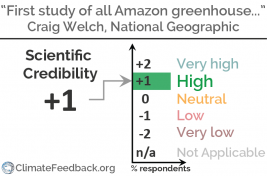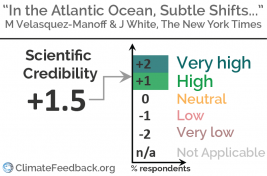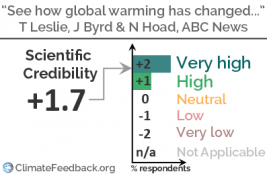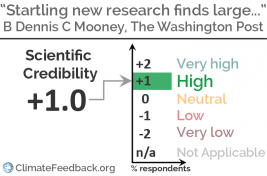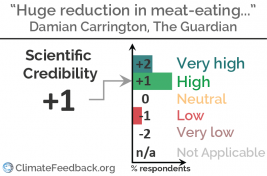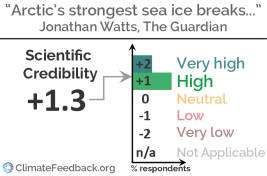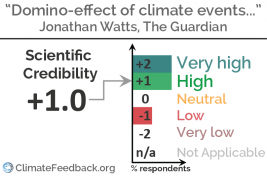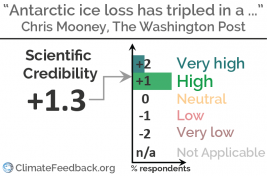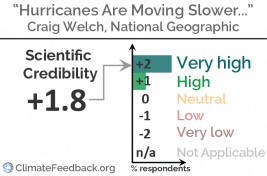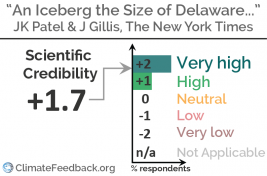.
Articles tagged as: Insightful definition
Destruction of the Amazon forest very likely contributes to global warming, as accurately described in The National Geographic article
in National Geographic, by Craig Welch
“The article is good overall, although there are two small issues. First, the title seems to overestimate the results. The scientific study the National Geographic article is based on cannot account for all of the climate forcers, as there are no Amazon basin wide estimates (as clearly stated in the study). This drawback could potentially change the overall warming effect, and therefore the title seems to exaggerate.”
— 23 Mar 2021
Atlantic ocean circulation system is slowing down, as accurately described in The New York Times article
in The New York Times, by Moises Velasquez-Manoff and Jeremy White
“This article is well-written, and the visuals are outstanding. It is a very strong piece of science communication. That being said, there is at least one error. The author mistakenly conflates the long-term warming hole with the shorter-term North Atlantic cold anomaly. The two phenomena have very different timescales and are likely driven by different mechanisms.”
— 11 Mar 2021
ABC article effectively illustrates important climate trends for Australian readers
in Australian Broadcasting Company, by Tim Leslie, Joshua Byrd, Nathan Hoad
“This article is exceptionally good in delivering accurate information in an engaging way. There are many useful statements made about the effects of climate change on extreme weather globally and in Australia and these have been backed up by links to relevant peer-reviewed literature.”
— 11 Dec 2019
Washington Post accurately describes ocean warming study (which has since been corrected)
in The Washington Post, by Chris Mooney, Brady Dennis
“The Washington Post article accurately reports the results and links to other topics using reliable sources. Quotations from Pieter Tans and Paul Durack add important caveats showing that this is strong new evidence but not the final say. This caution is vital for readers to interpret the findings.”
— 03 Nov 2018
Guardian story accurately describes study on environmental impacts of our food system
in The Guardian, by Damian Carrington
“Although the presented facts are clear, the scientists give a personal interpretation of the priorities and needed policies, which are not covered in the source. The data give added value, but are in line with earlier studies.”
— 17 Oct 2018
Guardian story accurately covers sea ice event but makes unsupported connection to weather patterns and the Gulf Stream
in The Guardian, by Jonathan Watts
“The article is clear and accurate. The authors have consulted several experts in the field to develop this story. They provide a scientifically sound overview of the current sea ice state north of Greenland, its historical context, and what has caused this anomaly.”
— 28 Aug 2018
Guardian coverage of essay on potential of future “hothouse” climate is generally accurate, but misstates some details
in The Guardian, by Jonathan Watts
“The article reasonably summarizes a new study published in PNAS, which describes the potential of tipping elements to enhance climate warming and the potential for the Earth to transition into a hot-house climate state. The article is careful to point out uncertainties and thus avoids being sensational. However, there are many small errors scattered throughout the article.”
— 09 Aug 2018
Washington Post article accurately describes latest estimate of accelerating Antarctic ice loss
in The Washington Post, by Chris Mooney
“The article presents the results of the study accurately, and uses multiple comments from scientists both involved and not-involved in the study to highlight the key findings. Some of the explanations are simplified, and there is a slight attempt at the end to downplay the results by suggesting scientists can’t predict the future. It is correct that the study presented is not making predictions, rather documenting past changes, but the positive trend is what we would expect based on the longer record of change we have for glaciers and ice caps.”
— 15 Jun 2018
National Geographic accurately covers research pointing to slower-moving hurricanes
in National Geographic, by Craig Welch
“This is an important topic and the article explains the new research findings clearly… Highlighting how this result about slowing storms is consistent across two studies that employ very different methodologies further helps convey to the public how we try to use multiple lines of evidence to understand how our world works and how it may chance in the future.”
— 08 Jun 2018
New York Times effectively informs readers about large Larsen C iceberg calving event
in The New York Times, by Jugal K. Patel and Justin Gillis
“The article handles a complex topic well. It would be easy to be alarmist with this subject matter, and while its lede edges that way, the main content of the article is very balanced. It also presents a lot of interesting information in a compelling manner.”
— 17 Jan 2018

